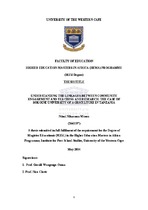| dc.description.abstract | This thesis sought to understand the various ways in which Sokoine University of Agriculture (SUA) in Tanzania, as a teaching and research institution, engages with its communities. This was prompted by the increasing calls upon the universities, both locally and globally, to become relevant to the communities through community engagement. Although the idea of community engagement has emerged and continues to gain momentum in higher education, there have been different understandings and shifts in the ways in which universities are practising community engagement. The study is located within the broader debates in the
literature, which sees community engagement as a contested concept in terms of its exact practices and outcomes, particularly in relation to the university’s core activities of teaching, learning and research. With the contextual nature of community engagement, a case study design was deemed to be suitable for this type of study. Data collection instruments comprised of document reviews, semi-structured interviews and focus group discussions. From the data collected and analysed, there are three key findings in this study. Firstly, community engagement in the Tanzanian higher education system in general has moved from
predominantly supporting communities to incorporating some aspects of teaching, learning and research, as well as economic pursuit. This is illustrated in practices such as national service programmes, continuing education, volunteering, field practical attachment, community-based research, commissioned research and consultancy, participatory action research, experiments and technology transfer. Secondly, whereas some of the practices are fading away in some Tanzanian higher education institutions, those that are active at SUA fall within both the Land-Grant (one-way) and Boyer’s (two-way) models of community engagement. Thirdly, there are no deliberate efforts by SUA to institutionalise community
engagement as a legitimate activity that enriches teaching, learning and research. As such, there are loose and discontinuous linkages between community engagement and SUA’s teaching, learning and research, attributed to a weak institutional approach to community engagement. | en_US |

